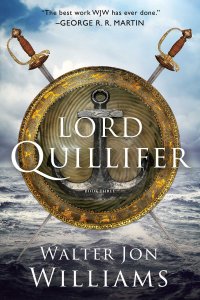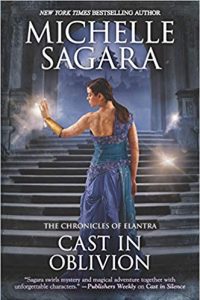Paul Di Filippo Reviews Lord Quillifer by Walter Jon Williams
 Lord Quillifer, Walter Jon Williams (Saga 978-1481490030, trade paperback, 528pp, $18.99) February 2022.
Lord Quillifer, Walter Jon Williams (Saga 978-1481490030, trade paperback, 528pp, $18.99) February 2022.
In 2009 my good friend Don D’Ammassa, noted critic, reviewer and fiction writer of long-standing prominence in our field, produced a volume which crystallized my perceptions of a heretofore overlooked or hidden genre. The book in question was the Encyclopedia of Adventure Fiction. In his perceptive introduction, D’Ammassa said in part: “Although there is no easily definable line of demarcation, we will assume that an adventure is an event or series of events that happen outside the ordinary course of the protagonist’s life, usually accompanied by danger, often by physical action. Adventure stories almost always move quickly, and the pace of the plot is at least as important as characterization, setting, and other elements of a created work.” So like horror fiction, then, adventure fiction can subsume a number of other genres: science fiction adventures, western adventures, fantasy adventures, mimetic adventures…. Thus the Encyclopedia of Adventure Fiction manages to include writers as disparate as William Golding and Mark Twain, John Gardner and Patrick O’Brian, Melville and Mailer.
If there is ever a new edition of the Encyclopedia of Adventure Fiction, Walter Jon Williams will surely merit a large and praiseful entry for his Quillifer series. Although nominally fantasy set in a secondary world, the books have developed, at least in the latter parts, into pure adventure of the Dumas school. At once a throwback and yet almost—dare I say it?—postmodern, they afford old-fashioned pleasures with a twenty-first-century sheen.
Readers can look up my review of the first volume to get up to speed. Basically, with many elaborate incidents, that novel recounts how a simple butcher’s son survived the destruction of all he knew and parlayed his wit and physical prowess into a position of some power and security and riches, with aspirations towards even higher goals.
Quillifer the Knight, the second installment, has our hero, only twenty-two-years old, running some trading ships in a fairly successful and lucrative enterprise, although he is still plagued by the animosity of the demiurge Orlanda. Basically, he has become a rich merchant, quite a step up—but still not the height of his ambitions. He manages to insinuate himself into the machinations of the royal court under Queen Berlauda by volunteering to slay some monsters. Along the way, he acquires a loyal manservant, Rufino Knott, helps a playwright named Blackwell, picks up enemies and friends and a married noblewoman as his mistress, and, most consequentially, meets the young Princess Floria. He is nominated “Lord Warden in Ordinary Against Monsters,” and so becomes fully embroiled in court intrigues. There are outrageous duels in the rigging of a ship and across rooftops, spying and treachery. By the end of book two, Berlauda is dead, Floria is Queen (and now also Quillifer’s lover, his old traitorous mistress having been discarded) and war is brewing.
The book offers all the glories of its predecessor, from juicy prose to Poictesme-style worldbuilding and stirring accounts of lust, bravery, cowardice and opportunism.
Lord Quillifer opens without any gap in time from the prior outing. We find Quillifer chatting amiably with his nemesis, the supernatural Orlanda. She will return only at book’s end, providing narrative symmetry and a dash of the fantastical. Otherwise, we are to embark on the pure naturalism of various military campaigns and court intrigues.
Floria and Quillifer, truly in love (a relationship depicted with real tenderness and affection, and one that serves to reveal immense changes in our hero since his early days), must hide their arrangement from everyone, so as to preserve Floria’s delicate and precarious position as virginal queen of a realm in revolt. Many surrounding kingdoms have now gone to war, with Duisland (Floria’s domain) being threatened mainly by a pretender to the throne with a large foreign army and navy at his command. Quillifer’s job, at home in the capital of Howel and abroad in the fields of battle, is to defend Floria and bring victory. But first he has to withstand attempts to slay him and to poison the queen. Luckily, his main antagonist, Lord Edevane, has fallen from power, and will soon be executed along with his traitorous wife.
We witness Quillifer win a huge sea battle. Then he is sent to rescue a trapped battalion, and to take them to the city of Ferrick. Fully the last quarter of our tale is the story of the siege of Ferrick and how Quillifer manages to endure and triumph. But upon his victorious return to the court, he finds all his hopes dashed, and his future uncertain. However, making the most of his fate, he bucks up, denies Orlanda any pleasure at his downfall, and heads off for new adventures, with a solid troop of pals and assistants. A fourth Quillifer book is guaranteed.
Williams’s powers of invention have not paled. The interpersonal affairs of all the schemers exhibit the same baroque intricacies of yore. The big military setpieces show a flair for clarity of action and surprise of developments, mimicking the real ups and downs of warfare. The worldbuilding details are richly strewn and often amusing—Quillifer’s regular introduction of new words into the country’s vocabulary is a running gag—and they work to promote tangibility of the scene. For instance, one recalls the vividness of meals and food from Tolkien’s subcreation. Such important quotidian matters help to anchor any invented place. Consider this passage then:
I was famished and applied myself to my dinner. First came a pottage of lamb accompanied by a posset of curdled cream, sack, and ale. Then came plates of oysters and offerings of gurnards stewed with white wine and spices. Next artichoke pies arrived, followed by a capon larded with lemons, and served in a sauce with dates, currants, almonds, sugar, and sweet butter. Then came a carbonado of mutton, pasties of marrow made to look like pease pods, a fricassee of rabbit, and a black pudding. Last were candied eryngo roots, a custard with almonds and artichokes, and an almond cream served in a bowl of sugar paste. With each remove came its own wine, gold or ruby red, most sweet to match the sugar, honey, and dried fruit in the dishes; and every dish was ornamented with pastry sculptures, the skins or heads of animals or birds, marchpane fantasies, or gold leaf.
Now that the days were growing longer, the cows were giving again, and it was a pleasure to have so much cream on the table.
In my dealings with the first book, I invoked a host of famous names, such as Cabell, Sabatini, and George MacDonald Fraser. At this point in Quillifer’s saga, Williams has indubitably affirmed his peerage with them. As Floria says of her lover, “There has never been anyone like you, and people don’t know how to think about you! They don’t see you as a great man; they see you as a freak, one of nature’s monstrosities.”
Luckily for us, we don’t have to live with or judge or appraise Quillifer, but only enjoy his roguish escapades.
 While you are here, please take a moment to support Locus with a one-time or recurring donation. We rely on reader donations to keep the magazine and site going, and would like to keep the site paywall free, but WE NEED YOUR FINANCIAL SUPPORT to continue quality coverage of the science fiction and fantasy field.
While you are here, please take a moment to support Locus with a one-time or recurring donation. We rely on reader donations to keep the magazine and site going, and would like to keep the site paywall free, but WE NEED YOUR FINANCIAL SUPPORT to continue quality coverage of the science fiction and fantasy field.
©Locus Magazine. Copyrighted material may not be republished without permission of LSFF.







